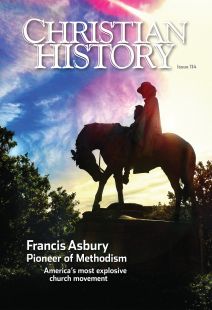Asbury’s simple message
FRANCIS ASBURY began to read the Bible when he was six years old. At the age of fourteen, he began to study the message of the Wesleys, which he “cherished with the warmest affection.”
Asbury never aspired to become a professional theologian or a polished academic. He wanted only to pass on to his generation the faith “once for all entrusted to the saints” (Jude 1:3). Ezekiel Cooper, delivering Asbury’s funeral sermon, said that Asbury had found his doctrines in the Bible, the Methodist articles of religion, and the Apostles’ Creed. Asbury’s message emphasized four essentials:
All can be saved. All groups that follow the theology of the Wesleys champion the belief that God wants no one to perish, but all to come to repentance, trust in Christ, and enter God’s kingdom: Christ’s atonement is not for some, but for all. A prominent Methodist saying is, “Free salvation for all people, and full salvation from all sin.”
The Holy Spirit witnesses assurance to the believer. Asbury preached that the presence of the Holy Spirit gives Christ’s followers assurance of eternal life. The objective nature of that assurance rests on biblical promises that God will save all who turn to him. The subjective aspect comes from the Holy Spirit’s inner witness to human spirits (Rom. 8:16).
Christians can be free from sin’s guilt and grip. Asbury insisted that God both forgives the presence of sin and frees from the power of sin, noting, “the testimony of the ministry [is] holiness of life.” He wrote in his journal on January 9, 1814, “I am divinely impressed with a charge to preach sanctification in every sermon.”
We move from inward change to outward service. Asbury preached that God summons all Christians to minister to the souls, minds, and bodies of others. He helped establish academies to educate young people, supported the publication of “suitable literature,” urged the end of slavery, opposed the manufacture and sale of “spirituous liquors,” fostered Christian cooperation, and provided relief for the destitute. But he believed that the greatest social benefit that Christianity offers is new life in Christ.
Asbury had neither the time nor the inclination to delve into complicated theological issues. But his personal example and institutional leadership inspired Methodists “to reform the continent, and spread scriptural holiness over these lands.” His message helped countless souls experience the transforming grace of God.
By Kenneth C. Kinghorn
[Christian History originally published this article in Christian History Issue #114 in 2015]
Kenneth C. Kinghorn, emeritus professor of church history, Asbury Theological Seminary.Next articles
Methodists and their stuff
Methodists have collected thousands of documents, objects, records, and artifacts
Christopher J. AndersonThe “Church of the Horse”
What was it like to be an American Methodist when Francis Asbury was alive?
Lester RuthCamp meetings: a Methodist invention?
Revival elements people experienced in 1801 had been part of Methodist life for several decades
Lester Ruth



